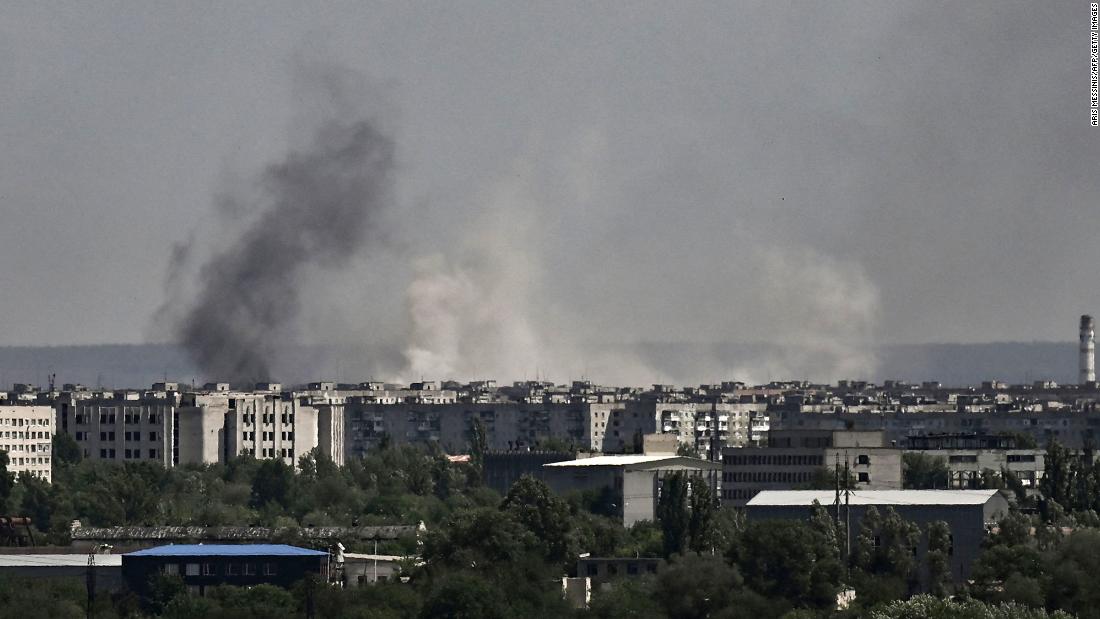
• No word from Ukraine’s missing Azovstal defenders, say some families…
Our live coverage of the war in Ukraine has moved here.
Latest round of EU sanctions includes a ban on 90% of Russian oil imports by end of 2022
From CNN’s Mitchell McCluskey and Hira Humayun
The European Union agreed to ban 90% of Russian oil imports by the end of the year, the leaders of the European Council announced on Monday.
Russian oil delivered by tankers would be banned, while an exemption will be made for the southern segment of the Druzhba pipeline, President of the European Commission Ursula von der Leyen said at a press conference.
The northern segment of the pipeline serves Poland and Germany, which have agreed to the embargo. The southern part goes to Hungary, Slovakia and Czech Republic. Von der Leyen said an exemption will be made for the southern segment, which accounts for 10% of imports on Russian oil.
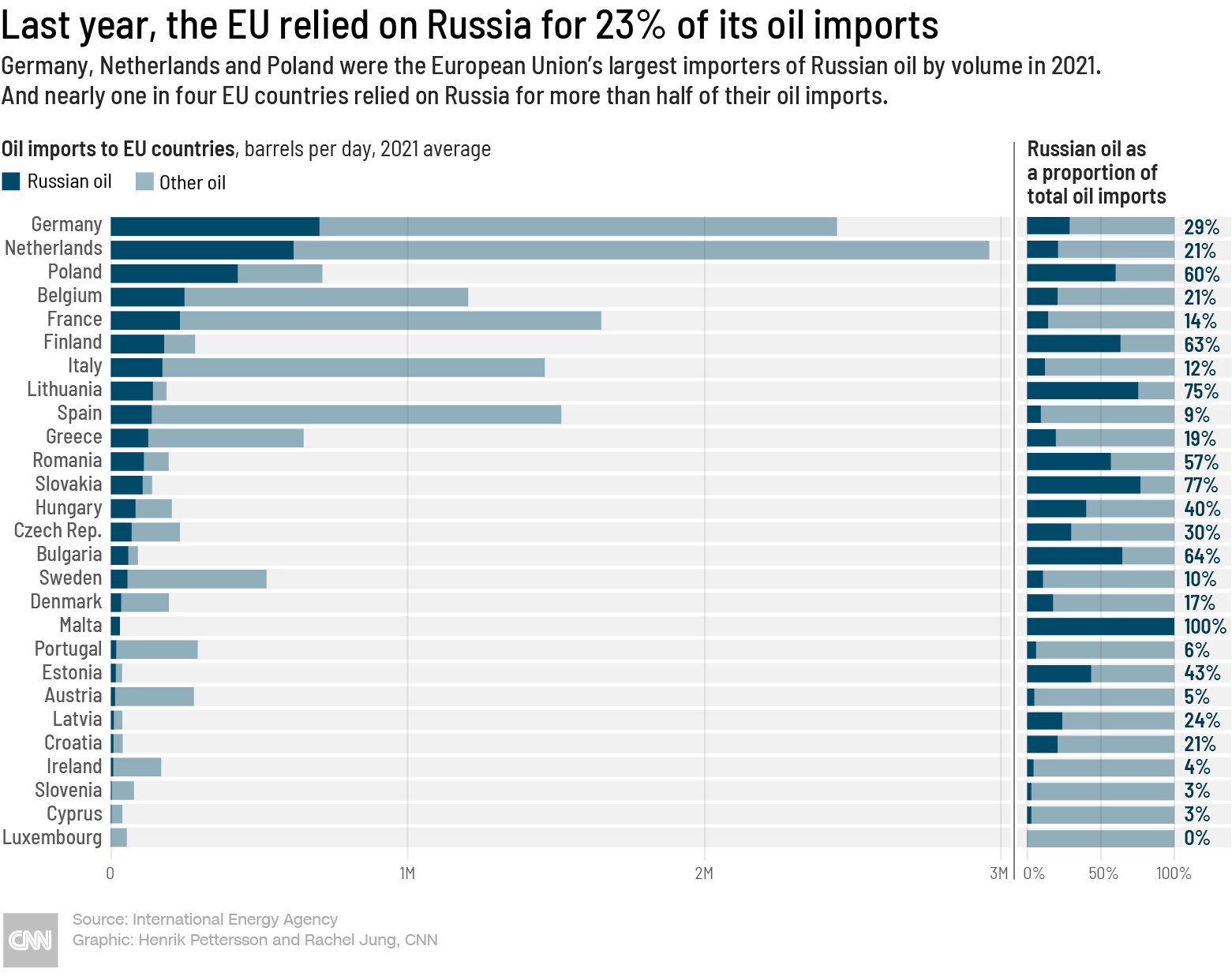
“We have a clear political statement by Poland and Germany that they will, as the others, wind down Russian oil, until the end of the year. We have covered overall 90% of Russian oil being wound down during this time frame. Leftover is the roundabout 10 or 11% that is covered by the southern Druzhba. We have agreed for the moment an exemption,” von der Leyen said.
Von der Leyen added that EU leaders would continue to meet to discuss details of the oil embargo and other parts of the sanctions package.
“The European Council agrees that the sixth package of sanctions against Russia will cover crude oil, as well as petroleum products, delivered from Russia into member states, with a temporary exception for crude oil delivered by pipeline,” the European Council said in a statement.
“The European Council will revert to the issue of the temporary exception for crude oil delivered by pipeline as soon as possible.”
Alternatives to Russian supply: Von der Leyen said it would be possible to increase usage of the Adria oil pipeline in Croatia to supply oil to Hungary without Russia. She added that Hungary’s refineries would need to be updated to accommodate oil from Croatia.
“It is big step forward what we did today. Because we have now gotten rid of coal – and this was already very difficult. Now we basically have the political agreement, how to phase out oil in a clear timeframe,” von der Leyen said.
Some context: Earlier this month when Europe proposed the ban on Russian oil, it stopped short of sanctioning Russia’s natural gas. According to Rystad Energy, Russia’s natural gas exports are predicted to generate about $80 billion in tax revenues for Moscow this year.
In recent weeks, Russia has been cutting off gas supply to countries such as the Netherlands, Poland, Finland, Bulgaria which have refused to comply with its demand for gas to be paid for in rubles.
The battle for Ukraine’s eastern region continues to intensify. Here’s what to know about the situation in Donbas
Fierce fighting continues in the Donbas region of eastern Ukraine with constant shelling reported in several areas and the battle for the key city of Severodonetsk intensifying. It comes as Russia’s foreign minister said pushing the Ukrainian army out of Donetsk and Luhansk is a priority for Moscow.
Here’s what we know about the situation in the Donbas region:
- “Maximum intensity” strikes: Ukraine’s Defense Ministry says that Russian forces are carrying out artillery strikes along much of the frontline that runs through the Luhansk and Donetsk regions as they try to break through Ukrainian defensive positions.
- The Donbas region encompasses the eastern areas of Donetsk and Luhansk. Ukrainian lines are being attacked by the Russians from the south, east and north.
- “The battles have reached maximum intensity. The Russian occupation forces engage along the entire frontline and try to shell our rear positions with artillery,” said Ukrainian Defense Ministry spokesperson Oleksandr Motuzianyk on Monday.
- Russian forces, he said, “are trying encircle our troops in Donetsk and Luhansk regions.”
- The General Staff of the Armed Forces of Ukraine reported Monday additional Russian efforts to degrade Ukrainian defenses in Luhansk and Donetsk, saying that artillery, airstrikes and missiles have been used in several places — including Lysychansk and Soledar.
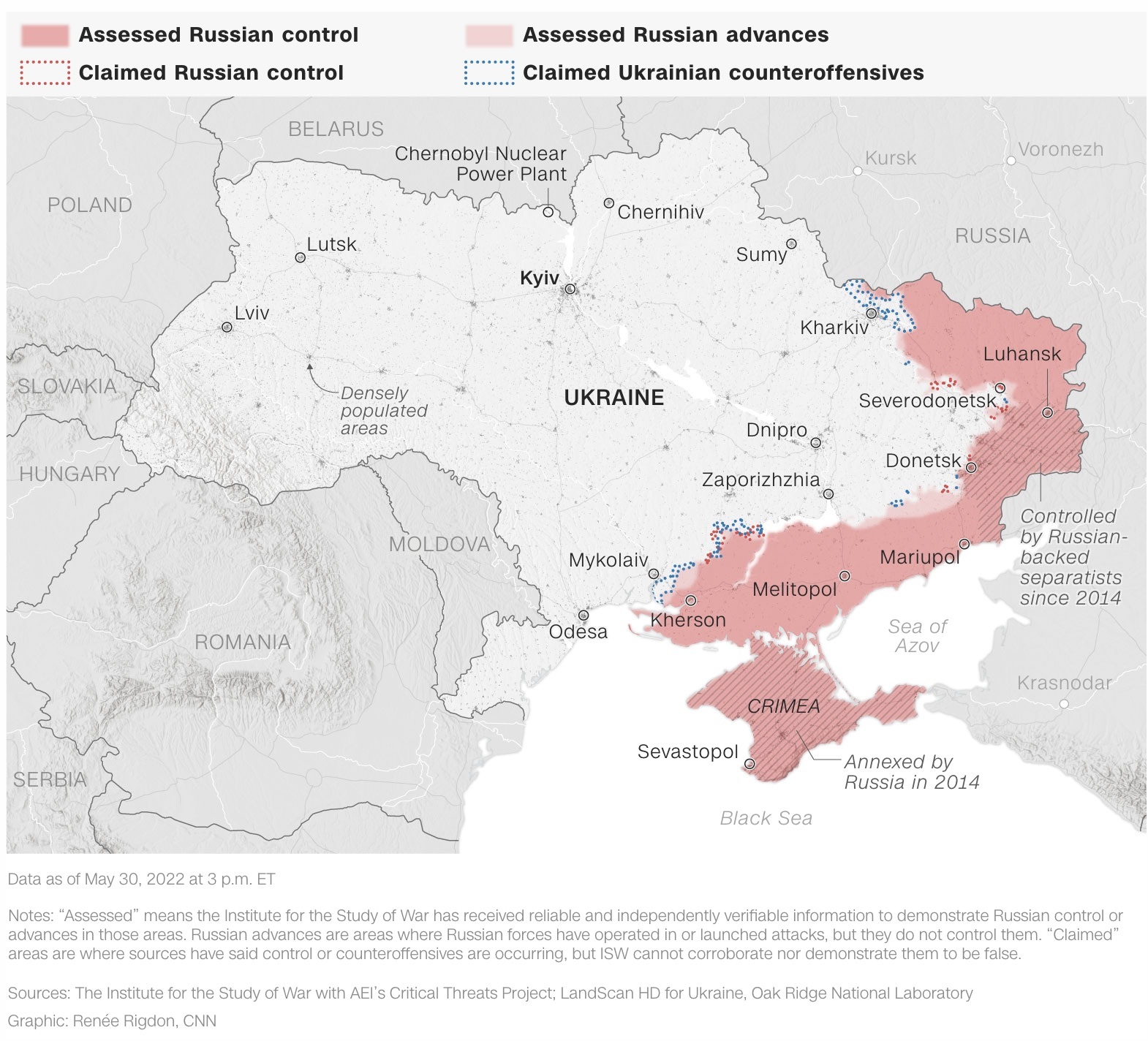
- “Most difficult” situation in Severodonetsk: The eastern Ukrainian city and neighboring Lysychansk are being hammered with constant shelling as Russian forces try to encircle Ukrainian defenders.
- Russian forces are trying to break through Ukrainian lines in this area and complete the seizure of Luhansk. They control about 90% of the region, according to most estimates.
- Serhiy Hayday, the head of the Luhansk Regional Administration, said late Monday that while all parts of Luhansk region still under Ukrainian control are being attacked, “the situation in Severodonetsk is really the most difficult.”
- He said Russian forces had been able to “push through territory from the outskirts of the city, where the Myr hotel is, and move a little deeper into the city. In the city now, there are and will be street battles.”
- Earlier, Hayday said Russian forces are “advancing into the middle of the city” after consolidating “their hold on the northeastern and southeastern outskirts” of Severodonetsk.
- Ukraine’s Defense Ministry spokesperson Motuzianyk said street fights have broken out but the Ukrainians “are trying to prevent the enemy from encircling our units near Lysychansk and Severodonetsk and blocking the main logistics path.”
- About two-thirds of properties in Severodonetsk have been reported as destroyed.
- On Monday, French journalist Frederic Leclerc-Imhoff was shot and killed in the area.
- In neighboring Lysychansk, one resident told CNN, “we haven’t slept in three months” as Russian strikes have increased in ferocity. Residents must decide between staying in their homes or fleeing for their lives.
- Shelling “does not stop” in Donetsk: Three civilians were killed and several others wounded in fierce fighting in the Donetsk region on Sunday.
- Russian forces shelled areas north of the city of Donetsk with small arms, tanks, artillery, mortars, and MLRS “Grad” rockets, according to the regional military administration for Donetsk.
- On Monday morning, there was also shelling in areas to the southwest of Donetsk city.
- “The situation is tense. The shelling along the front line does not stop,” said the head of the Donetsk regional military administration, Pavlo Kyrylenko. “The hottest spots are (in the direction of) Avdiivka, Toretsk, and Lyman.”
- Kyrylenko said the key route from Bakhmut to Lysychansk is still under Ukrainian control, but the Russians are “constantly shelling the route.” It is the main route for providing humanitarian goods and is important for evacuations, he added.
- The General Staff said Russian efforts to degrade Ukrainian defenses continues, with artillery, mortar and multiple rocket systems being used against several towns and villages in the direction of Bakhmut.
WATCH:
European Commission president: EU leaders have agreed “on principle” on new sanctions package against Russia
From CNN’s Mitchell McCluskey
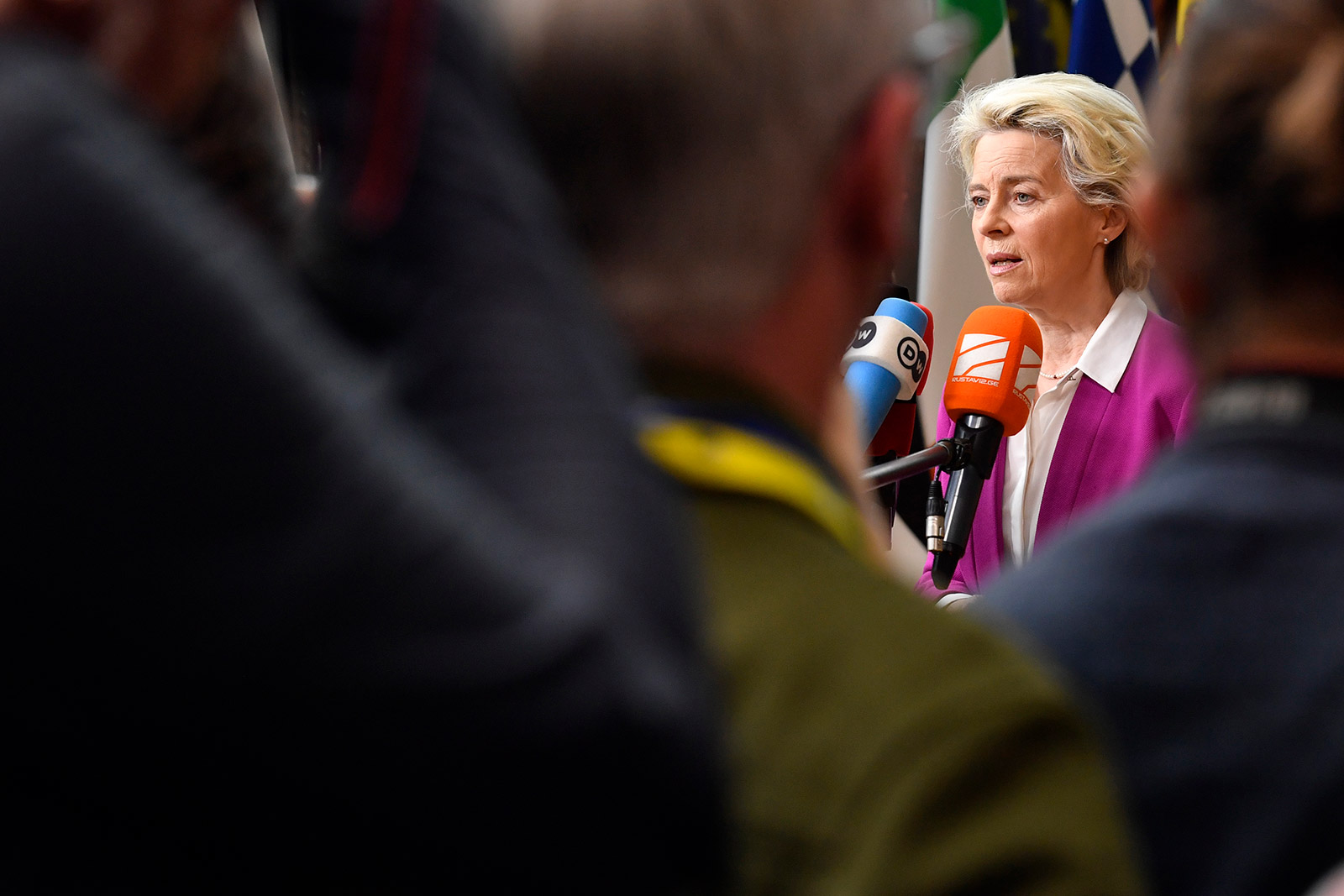
European Union leaders have agreed “on principle” on a new sanctions package against Russia, President of the European Commission Ursula von der Leyen said in a news conference on Monday following a summit in Brussels.
“I’m very glad that the leaders were able to agree in principle on the sixth sanctions package, this is very important. Thanks to this, (the) council should now be able to finalize a ban on almost 90% of all Russian oil imports by the end of the year. This is an important step forward,” von der Leyen said.
Von der Leyen added that the remaining 10% of imports of Russian oil is via a pipeline into Hungary and Slovakia. Those imports would be exempt from the sanctions, she said.
“Two-thirds of the oil that we have in the EU is seaborne and one-third in pipeline,” von der Leyen said, “We have agreed for the moment being for an exemption. We have agreed that the council will revert to the topic as soon as possible.”
Von der Leyen stated that the leaders agreed to remove Sberbank, Russia’s largest bank, from the SWIFT network, as well as institute a ban on the insurance of Russian ships by EU companies and a ban on providing Russian companies with a range of services.
Von der Leyen added that there would be a suspension of broadcasting of three more Russian state outlets in the EU. She did not specify which broadcasters would be suspended.
“We are working on a mechanism to have an extraordinary macrofinancial assistance package of 9 billion (euros), which we will work on now in the next week — how to put it into place,” von der Leyen said.
The leaders also held intensive talks on the reconstruction of Ukraine. Von der Leyen emphasized that coordination across EU states is necessary to carry this out.
“It was good that we could discuss the proposal of the commission in the council to create a platform where we can channel all of the international initiatives to be clear together on the direction on travel, to raise the necessary investment, but also to be very clear that investment comes with reform,” she said.
European Council is ready to grant Ukraine 9 billion euros, chief says
From CNN’s Hira Humayun
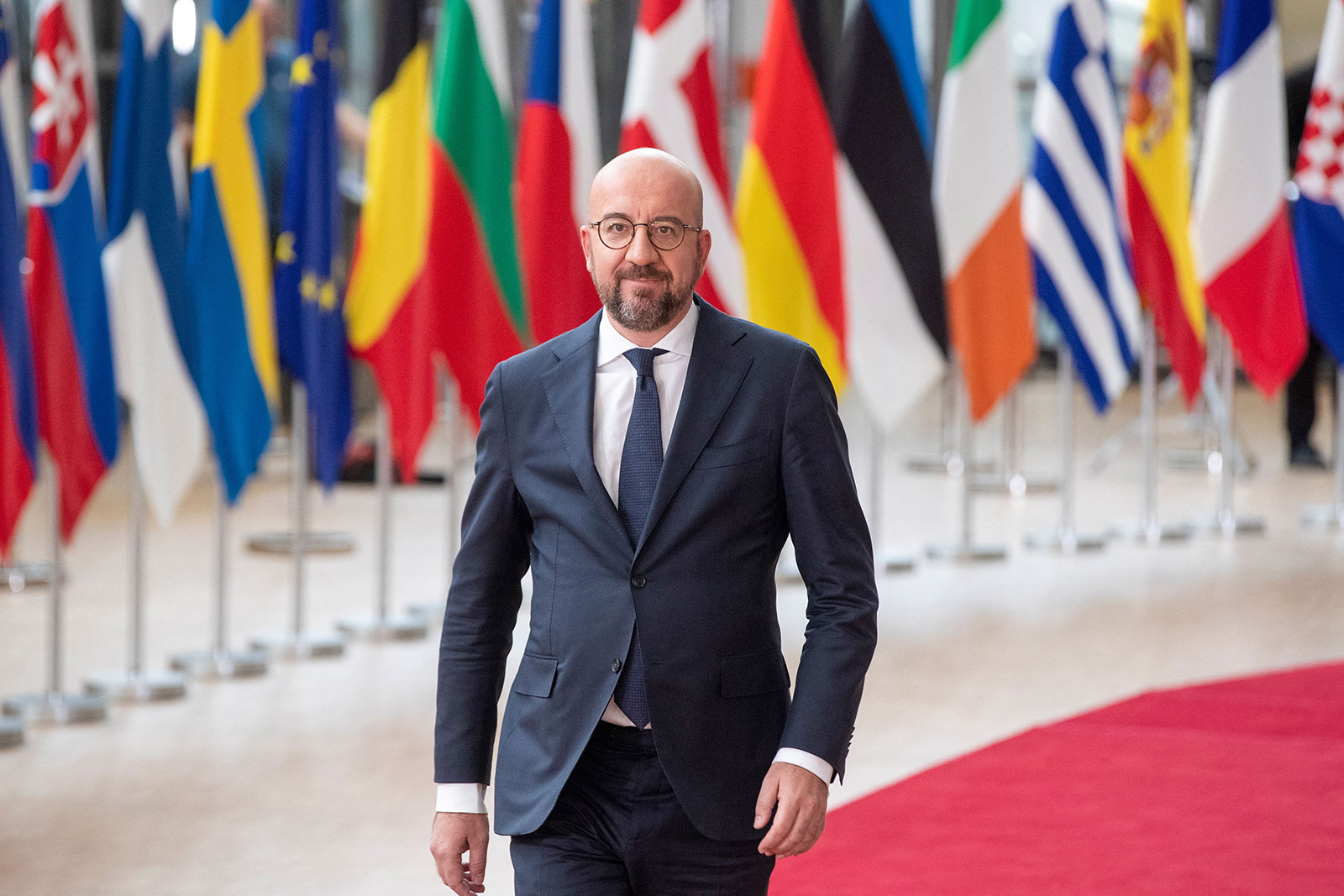
The European Council is ready to grant Ukraine nine billion euros (about $9.6 billion), European Council President Charles Michel tweeted Monday night.
“#EUCO will continue helping #Ukraine with its immediate liquidity needs, together with @G7. EUCO is ready to grant #Ukraine EUR 9 billion. Strong and concrete support to #Ukraine’s reconstruction,” he tweeted.
His tweet comes after EU leaders met in Brussels on Monday to discuss a sixth package of sanctions against Russia, and agreed on a partial ban of Russian oil imports.
Following the decision, EU Commission President Ursula von der Leyen tweeted saying, “I welcome the #EUCO agreement tonight on oil sanctions against Russia. This will effectively cut around 90% of oil imports from Russia to the EU by the end of the year.”
EU agrees on partial ban of Russian oil imports
From CNN’s Niamh Kennedy in London
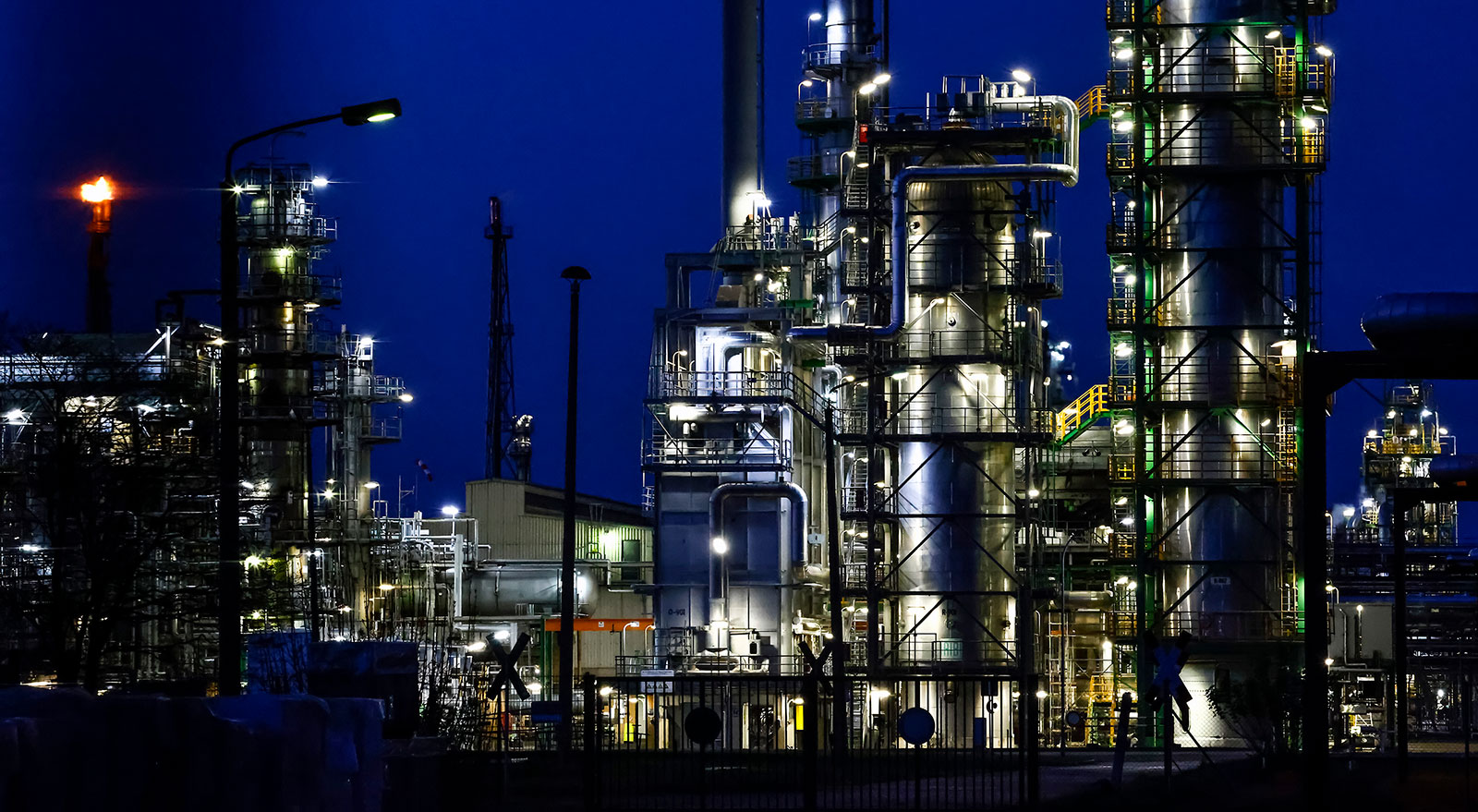
The European Union has agreed on a partial ban of Russian oil imports, according to European Council chief Charles Michel.
“Agreement to ban export of Russian oil to the EU. This immediately covers more than 2/3 of oil imports from Russia, cutting a huge source of financing for its war machine,” Michel announced in a tweet on Monday evening.
Michel’s announcement followed an extraordinary European Council summit attended by EU leaders in Brussels on Monday to discuss a sixth package of sanctions against Russia.
“This sanctions package includes other hard-hitting measures: de-Swifting the largest Russian bank Sberbank, banning 3 more Russian state-owned broadcasters, and sanctioning individuals responsible for war crimes in Ukraine,” Michel added.
EU leaders will meet again in Brussels on Tuesday to discuss the bloc’s response to Russia’s invasion of Ukraine.
More background: Officials first proposed joining the US and others in banning Russia’s oil a month ago as part of a sixth package of EU sanctions over the country’s invasion of Ukraine. But an agreement has been held up by some countries, like Hungary, that are particularly reliant on Russian crude delivered via pipeline.
An EU official told CNN earlier that banning all seaborne oil would cover more than two-thirds of imports from Russia.
Europe is the biggest buyer of Russian energy. Russian crude accounted for 27% of the bloc’s imports in 2021, according to Eurostat. That’s around 2.4 million barrels per day, data from the International Energy Agency shows. About 35% of that was delivered via pipelines to the bloc, according to the IEA.
But pipeline deliveries made up a much bigger share of Russian oil shipments to Hungary (86%), the Czech Republic (97%) and Slovakia (100%).
See the European Council chief’s tweet:
CNN’s Anna Cooban and James Frater contributed reporting to this post.
White House expressed support for Turkey’s continued talks with Sweden and Finland over NATO membership
From CNN’s DJ Judd
In a readout Monday, the White House said US President Joe Biden’s National Security Adviser Jake Sullivan spoke by phone with Ibrahim Kalin, a spokesperson and chief adviser to Turkey’s President Recep Tayyip Erdogan.
According to the White House, Sullivan “expressed support for Turkey’s continued direct talks with Sweden and Finland to resolve concerns over their applications for NATO membership, which the U.S. strongly supports,” while the two “discussed their ongoing support for Ukraine in the face of Russia’s continued aggression, as well as their respective efforts to enable Ukrainian agricultural exports to reach global markets.”
Some more context: Finland and Sweden’s decision to apply for NATO was a major shift prompted by Russia’s war in Ukraine.
Last week, Finnish Foreign Minister Pekka Haavisto expressed optimism that “sooner or later, Finland and Sweden will be members of NATO” and said discussions with the Turkish government would continue as Ankara threatens to block the two nations from joining the defensive alliance.
In an interview with CNN in Washington, DC, last Friday, Haavisto said he expected that the topic of Finland’s NATO membership and overcoming Turkey’s current opposition would come up in his conversations with US Secretary of State Antony Blinken in his meeting later in the day, adding he was “quite confident” that other NATO countries had spoken with Turkey as well.
At a news conference following the meeting between the top US and Finnish diplomats, Blinken said the US is engaged directly with Turkey “but the focus is on the work that Finland, Sweden and Turkey are doing together to address the concerns.”
CNN’s Jennifer Hansler contributed reporting to this post.
Zelensky sends condolences to the family of French journalist killed in Ukraine
From CNN’s Niamh Kennedy in London
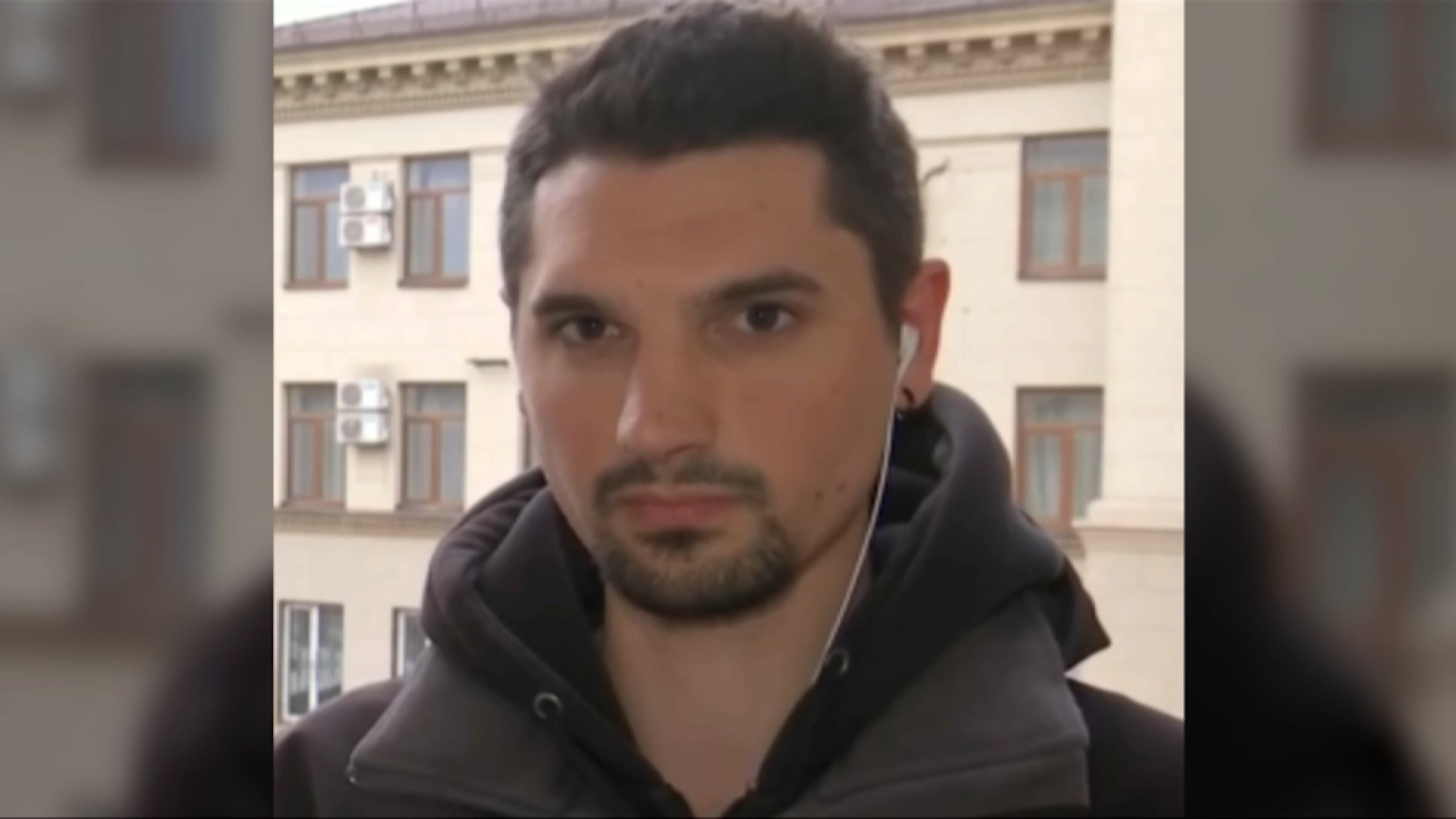
Ukrainian President Volodymyr Zelensky has sent his condolences to the family of French journalist Frederic Leclerc-Imhoff who was killed in Ukraine on Monday.
Speaking during his nightly address on Monday, Zelensky said he wanted to pay his “condolences to the relatives of this journalist.”
“He is the 32nd journalist killed in the war and the situation remains very hard,” the Ukrainian President remarked.
Leclerc-Imhoff, a 32-year-old journalist with French news channel BFMTV, was shot and killed “onboard a humanitarian bus, alongside civilians forced to flee to escape the Russian bombs,” French President Emmanuel Macron said in a tweet earlier on Monday.
Russian energy giant Gazprom will halt gas supplies to Dutch gas trader GasTerra starting Tuesday
From CNN’s Anna Chernova
Russian state energy giant Gazprom confirmed Monday that it will cut off natural gas supply to Dutch gas trading firm GasTerra starting Tuesday, May 31.
“Gazprom Export has notified GasTerra of the suspension of gas supplies from May 31, 2022 until payment is made in accordance with the procedure established by the aforementioned Decree,” a statement on Gazprom’s Telegram channel read, referring to Russian President Vladimir Putin’s decree stating gas payments should be made in rubles.
On Monday, Danish energy company Ørsted and Dutch gas trading firm GasTerra warned Russia could turn off the taps as soon as Tuesday because they had refused to make payments in rubles — just weeks after Moscow did the same to Poland, Bulgaria and Finland.
Gazprom so far hasn’t said anything officially about cutting gas supplies to Denmark’s Ørsted.